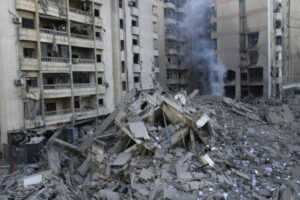Lebanon’s prime minister yesterday Friday accused Israel of denying any ceasefire with the Shiite movement Hezbollah, following a series of aerial bombings on Beirut’s southern suburbs, the first this week on that faction’s coveted stronghold.
The Israeli air force launched new strikes in Lebanon, including at least 10 on the southern suburbs of the Lebanese capital, turning entire buildings into piles of rubble.
The bombings came hours after two US envoys visited Jerusalem as the US sought to secure through negotiations an end to the war between the Israeli army on the one hand and Hezbollah, which generalized in September, and the Palestinian Islamist movement Hamas in the Gaza Strip, which has been going on for the 393rd day.
The fact that Israel “again targeted southern suburbs of Beirut” where it carried out “devastating bombings” is “an indication that confirms the rejection of all efforts to achieve a ceasefire”, Lebanese Prime Minister Najib Mikati
said.
The Israeli armed forces countered that they struck “targets” of the Iranian-affiliated Shiite movement in Beirut and Nabataea (south).
Other shelling, in Baalbek (east), without warning, killed at least 52 people and wounded 72 others, according to Lebanese authorities, while Tyre (south) was also hit.
In communities in Baalbek, men and women were walking among destroyed buildings, cameras from the French News Agency’s television service captured. “This is a residential area, there is no military installation here,” assured Gassan let Sal, a resident.
Lebanon’s national news agency ANI also spoke of bombings in Bid Jbail (south) and Alia, east of Beirut.
Following Israel’s repeated bombings of Baalbek and Tyre, UNESCO World Heritage-listed cities, a UN official made no secret of her concern that the conflict would have collateral damage to Lebanese archaeological sites.
“Lebanon’s cultural heritage must not become another victim” of the war, warned the UN’s special coordinator for Lebanon, Janine Hennis-Plushert.
Israeli armed forces have been launching massive aerial bombardments against Hezbollah since September 23 and have been conducting ground operations in southern Lebanese territory since September 30.
Israel says it wants to neutralize Hezbollah in southern Lebanon to allow the return to the north of some 60,000 residents who have been forced to flee their homes because of incessant rocket launches since the day after the war broke out in the Gaza Strip more than a year ago.
In the early hours of the morning, at least seven Israelis were injured after three rockets fired from Lebanon crossed into Israeli territory, an ambulance service said. Earlier, the Israeli armed forces said sirens sounded in sectors of central Israel, then reported three missiles and interceptions, without going into details.
Just 24 hours before the US presidential election, Israeli Prime Minister Benjamin Netanyahu received US envoys Amos Hockstein and Brett McGirk the day before yesterday.
According to Israeli media quoting government sources, the plan proposed by the US envoys called for the withdrawal of Hezbollah fighters from southern Lebanon, which borders northern Israel, and the withdrawal of the Israeli army from that area, with control returning to the Lebanese Armed Forces and UN cybercrats.
But Israeli officials counter that the army will not be withdrawn from southern Lebanon until an agreement is reached that meets the demands made by the Netanyahu government for Israel’s security.
The head of UN peacekeeping operations, Jean-Pierre Lacroix, reaffirmed yesterday that the Cyclones remain in Lebanon, but stressed that they have been forced to “abandon” their positions and there is a risk that the latter could be “occupied by one side or the other.”
At least 1,900 people have been killed since September 23 in Lebanon, according to an AFP count based on official data.
The US Pentagon announced last night that it had decided to deploy additional military capabilities to the Middle East, which will arrive in the coming months, to “protect Israel” and as a warning to Iran.
The assets to be deployed in the region include ballistic missile countermeasures systems, fighters, long-range B-52 strategic bombers and other military aircraft, the US Defense Department explained.
Meanwhile, Israel is continuing its operations against Hamas in the Gaza Strip. Bombings hit homes killing nine people in Jabalia (north) and Nusayrat (central), according to the enclave’s health ministry.
The shelling was launched “every day, morning, noon, afternoon, evening,” said Izzedine Abu Sawis, a resident of Nusayrat.
The Israeli army announced the death of Izzedine al-Qassab, a local commander of the Hamas military arm in Rafah, at the southern end of the enclave.
In Beit Lahia, men carried a lifeless body with blankets across debris-strewn streets after a bombing, French News Agency television cameras captured.
All residents of the northern part of the enclave, where the Israeli army has been concentrating its operations since October 6 to prevent Hamas units from regrouping there, are at “imminent risk of dying”, UN humanitarian agencies warned yesterday.
Despite international appeals, efforts to end hostilities under an agreement remain fruitless.
Yesterday, the Palestinian movement announced that it refused to consider a proposal for a short-term ceasefire proposed by the countries mediating the indirect negotiations, demanding“a complete and permanent ceasefire.”
The Hamas assault on southern Israel on Oct. 7, 2023, the trigger for the war, claimed the lives of 1,206 people, the majority of them civilians, according to a French News Agency count based on official data, which includes hostages killed in captivity or already dead when they were taken to Gaza.
Of the 251 people kidnapped, 97 remain hostages in the Gaza Strip, though 34 of the latter have been declared dead by the Israeli army.
Widespread Israeli military retaliatory operations in the Gaza Strip have claimed the lives of at least 43,259 Palestinians, the majority of them civilians, according to data from the Hamas government’s health ministry, which is reliably classified by the UN.
Ask me anything
Explore related questions





